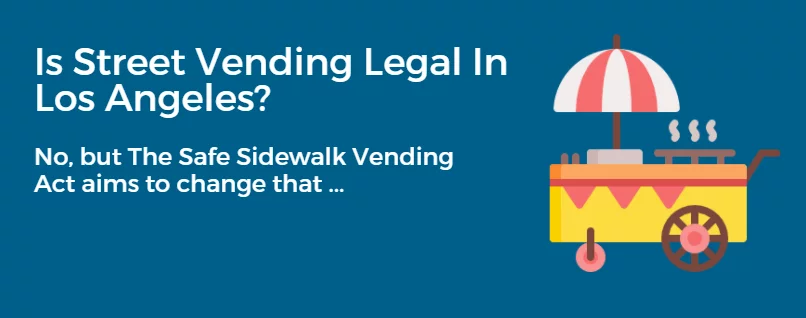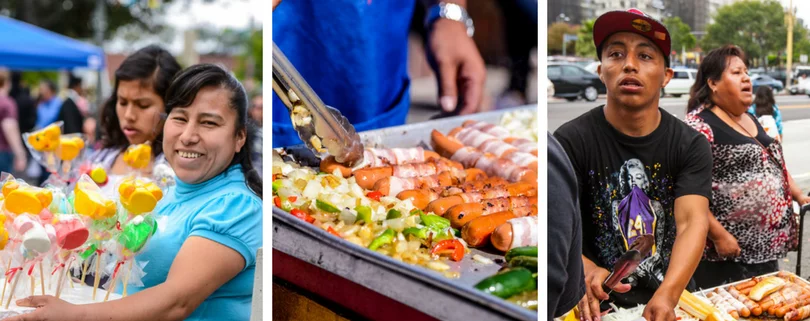Is Street Vending Legal In Los Angeles?
Los Angeles lacks a legal framework for selling food on the street, but a new bill aims to change that.
Street vending is a $504 million industry in Los Angeles.
According to the Bureau of Street Services, an estimated 50,000 street vendors set up shop on the sidewalks of Los Angeles. While the majority of vendors sell merchandise, roughly 10,000 sell sell hot dogs, ice cream, and other foods.
So, is street vending legal in Los Angeles?
Despite years of debate and little-to-no movement from lawmakers, street vending is still technically illegal. With that said, there have been some new developments that may result in the decriminalization and regulation of street vending.
Let’s take a closer look …
Is Street Vending Legal In Los Angeles?
Street vendors are a common sight in Los Angeles with an estimated 10,000 food vendors and 40,000 other vendors operating on the sidewalks and in the parks every day.
But the city, like other cities and towns in California, is struggling to regulate the industry. Street vendor ordinances vary from city to city and currently, local authorities in each city create the rules on how, where and when vendors can operate.
Enforcement of rules has been somewhat haphazard, leaving many vendors and local businessmen unsure of what regulations are really important. There has been disagreement on many fronts.
Complicating matters is the fact the Los Angeles is a “sanctuary city” for immigrants (although this status is being opposed by many counties) and many of the immigrants are sidewalk vendors. Their status can be influenced and controlled by the Immigration and Customs Enforcement agency (ICE), adding a level of fear to an already unstable situation.
Violations of health regulations and other municipal codes have been classified as crimes, resulting in confiscation of goods, fines and vendor punishment. Immigrants with violations were subject to detention centers and/or deportation. Violations carried penalties of up to six months in jail and up to $1,000 in fines.
Street Vendor Regulations
There is a current program in Los Angeles called the Street Vending Compliance Program. It involves inspectors monitoring vendors who prepare and/or sell food without a Public Health Permit.
All approved mobile food facilities are given numbered and dates stickers affixed to their carts or trucks. If vendors do not have the appropriate sticker, they can be operating illegally.
Inspectors look for violations like food obtained from unapproved sources or food held at unsafe temperatures. They also look for unsanitary conditions or equipment, possible contamination, and lack of water for washing hands or utensils.
The inspectors encourage the public to be observant and report any suspected violations to the authorities for promised follow-up.
While these rules help, they are not universally enforced. And they do not cover numbers or locations of vendors relative to the business establishments nearby.
The Safe Sidewalk Vending Act: Decriminalizing Street Vending
The California legislature is trying to change that uneven landscape for street vendors by introducing Senate Bill 946, known as the Safe Sidewalk Vending Act, a bill designed to regulate vending statewide, along with many regulations to be followed at local levels. It is an attempt to decriminalize street vending.
The bill requires local governments to create a sidewalk licensing program. The bill allows vendors to operate where they please unless there is a health, welfare, or safety issue.
This allows vendors to operate in parks or near brick-and-mortar businesses without needing the permission of those businesses.
The bill does not cap the number of vendors allowed in any community.
The bill also prohibits street vendors from operating without a license or breaking the rules of the licensed programs. Violations of either are punishable by fines.
On a municipal level, the City Council is at work trying to hammer out a system that works for everyone, proposing that the city hand out a limited number of permits. These would allow up to two stationary vendors on each face of a block in commercial and industrial zones. It would also allow a number (undetermined so far) of mobile vendors in residential areas.
But there are parts of the proposal that need work, like how much the permits will cost, how violations will be penalized, and how they will be enforced.
Also needing more work is the plan to allow some neighborhoods to impose stricter rules on sidewalk vending.For example, one such neighborhood, Encino, produced a Community Impact Statement written by the Encino Neighborhood Council, that suggested a maximum of four vendors per mile, limited to commercial streets, parks, and transit hubs. It also suggested that vending should not be allowed within 500 feet of schools or on residential streets.
Lawmakers still must decide on all these details before permits will start being issued.
Concerns Moving Forward
The bill is causing controversies in many circles. Sidewalk vendors argue that some of the proposed rules are too restrictive. Vendors formed the L.A. Street Vendor Campaign to dissuade neighborhoods from opposing sidewalk vending.
Vendors also oppose any requirement for getting permission from neighboring businesses to set up shop outside. And they want the Council to loosen its proposed restrictions on the number of vendors allowed on each block.
Brick-and-mortar businesses are worried about how legalizing street vending will affect them. They raise concerns about blocked walkways, trash, and what they see as unfair competition. They have suggested that vendors should be required to get permission from neighboring businesses to avoid antagonistic relationships.
Backers of the bill say that it sets parameters around local regulations but allow cities the flexibility to craft their own rules based on health and safety concerns.
In order to provide a unified front, these business groups formed The Coalition to Save Small Business and are active in voicing their views. While they support many of the proposed restrictions on how and when vendors can operate, they remain concerned about how the city will enforce new regulations.
Conclusion
As it stands today, selling food or goods on the sidewalks of Los Angeles can lead to misdemeanor charges. City officials will now draw up new rules that would strip those criminal penalties and replace them with fines. They will move to authorize the city to issue vending permits, the first step toward legalization.
But the process of working out the details and handing out permits could take months. In the meantime, vendors who operate on city sidewalks of L.A. could still be cited and fined for violating any municipal code – but they would not face criminal convictions.
Street vending is the first step in building a business in the U.S. for many immigrants. It has been called an economic lifeline for many who have been shut out of a more formal economy. Legalization of street vending is a positive step in protecting that life.
Are you in search for a certified attorney to represent you?
Let us help you find one today!




